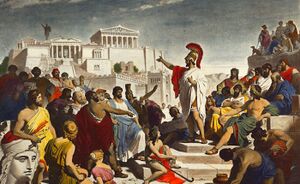Hellenic Syara

In the histography of Syara, Hellenic Syara refers to the period of Syaran history where Hellenic culture was dominant in Syara. Typically Hellenic Syara is set to span from Classical Syara throughout the Makedonian Empire, and ended sometime prior to the establishment of the Rioni Union. During this time Hellenic culture spread throughout Tyran, with residual impact still felt in locations such as Gylias centuries later.
Hellenic customs emerged in Syara sometime during the Archaic Age and by the Classical Age had come to preeminence throughout north-west Siduri. Spread by merchants and travelers across the continent, they established themselves as far away as the Liúşai League. The rise of Makedon saw Hellenic customs take on a more martial nature but retained many aspects of Hellenic customs and interests, including philosophy, poetry, theater, science, and mathematics, which flourished under the Empire and spread across the realm. During this time the Makedonian language grew to become the de facto tongue of Syara, and a common language for many travelers throughout Siduri.
The decline of Hellenic culture is widely held to coincide with the Fall of the Makedonian Empire. Depopulation of Syara as a result of the Burning Plague saw a sharp decrease in Makedonian language speakers, while the Empire's subsequent political and economic decline further limited the expansion and proliferation of Hellenic customs. By the 10th Century, contact with the Kingdom of Dragovita resulted in the widespread adoption of the Early Slavic Dragovitan language, which became a common trade language among Syaran merchants along the Sanguine Sea. By the time of the Arkoennite conquest and the formation of the Makedonian Khanate many Syaran peasants spoke early Syaran, a Slavic language, rathern than Makedonian. Makedonian continued to decline in usage during the decades leading up to the establishment of the Rioni Union, and by the time of the formation of the Republic of Syara, the Makedonian language was effectively dead with no recorded native speakers remaining.
The nature of Hellenic Syara has been a source of contention among Syaran historians. Criticism usually rests on the nature of dividing Syaran culture into distinct "phases", which some historians, notably Yatzo Stefanov Atanasov, object to:
Despite the inherent desire to associate it closely with humans, culture is not a human. It is not even an organism; it does not have a consistent life cycle of birth, reproduction, and death. Culture is nebulous, waxes and wanes at the slightest touch, and yet contains its own incredible inertia. Culture does not simply start or stop, it adapts, evolves, and changes over time. Hellenism did not suddenly disappear from Syara, nor did the Syarans "abandon" them; they merely changed as the seasons do, as culture always does, so long as people, societies, and nations change, and always will.
In media, Hellenic Syara is often associated with the theater and poetry of Classical Syara, and is often invoked to refer to a specific style of prose and themes common in the epoch.